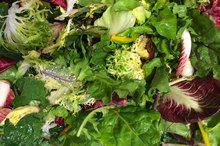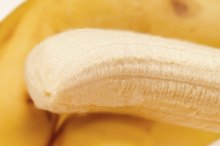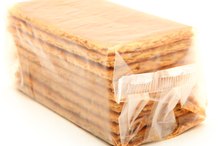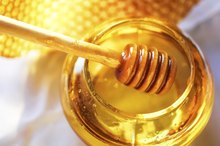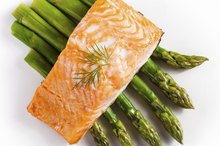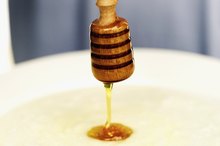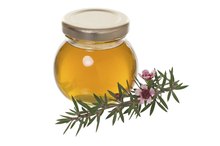What does fact checked mean?
At Healthfully, we strive to deliver objective content that is accurate and up-to-date. Our team periodically reviews articles in order to ensure content quality. The sources cited below consist of evidence from peer-reviewed journals, prominent medical organizations, academic associations, and government data.
- Linus Pauling Institute: Potassium
- U.S. Food and Drug Administration: Guidance for Industry - A Food Labeling Guide (10. Appendix B: Additional Requirements for Nutrient Content Claims)
- Centers for Disease Control and Prevention: Where's the Sodium?
The information contained on this site is for informational purposes only, and should not be used as a substitute for the advice of a professional health care provider. Please check with the appropriate physician regarding health questions and concerns. Although we strive to deliver accurate and up-to-date information, no guarantee to that effect is made.
Honey and Potassium
Fewer than 2 percent of adults in the United States get enough potassium regularly, reported a 2012 study published in "The American Journal of Clinical Nutrition." Adequate potassium is required for your body to maintain proper nervous and muscular system function 4. A diet lacking potassium may increase your risk of osteoporosis, high blood pressure, stroke and kidney disease 4. While many foods -- including honey -- contain potassium, not all are a good source of the mineral.
Potassium Content
According to the U.S. Department of Agriculture, a 1-tablespoon serving of honey contains 11 milligrams of potassium. Healthy adults need 4,700 milligrams of potassium each day, and 1 tablespoon of honey would supply only 0.23 percent of this requirement. Since honey does not provide at least 10 percent of the recommended daily allowance of potassium, U.S. Food and Drug Administration guidelines specify that it cannot be considered a good potassium source.
- According to the U.S. Department of Agriculture, a 1-tablespoon serving of honey contains 11 milligrams of potassium.
- Healthy adults need 4,700 milligrams of potassium each day, and 1 tablespoon of honey would supply only 0.23 percent of this requirement.
Comparison to Other Foods
How Much Potassium Does a Female Need?
Learn More
Honey contains about as much potassium in a 1-tablespoon serving as 1 teaspoon of ground dried cinnamon, a single muscadine grape, one cube of chicken broth or bouillon or 1 fluid ounce of a prepared coffee substitute 4. For foods that supply 10 percent or more of the RDA of potassium per serving, choose baked potatoes, prune juice, raisins, tomato juice, dried apricots or beans like soybeans or Lima beans.
Sodium and Potassium
To get the maximum benefit out of the potassium you obtain from foods like honey, control your sodium intake. In your body, the level of these two minerals is connected: the more sodium in your bloodstream, the more potassium your body eliminates 4. A diet high in sodium increases your risk of high blood pressure, heart disease and stroke. By contrast, eating more potassium helps lower your body's sodium concentration. Try to limit yourself to 2,300 milligrams of sodium daily and to include more high-potassium foods in your regular meals 4.
Expert Insight
What Is the Potassium Content in a Banana?
Learn More
Although honey does contain a small amount of essential vitamins and minerals, its caloric intake is primarily provided by simple sugars. The USDA recommends limiting your intake of rich simple sugar sources like honey as much as possible since they add calories to your diet without adding a significant amount of nutrients. Enjoy honey only occasionally and in moderation; whenever you can, learn to consume foods without added honey.
Related Articles
References
- Linus Pauling Institute: Potassium
- USDA National Nutrient Database: Basic Report - 19296, Honey
- USDA National Nutrient Database: Nutrient Lists - Potassium, K (mg)
- Cigna: Potassium (K) In Blood
- Centers for Disease Control and Prevention: Where's the Sodium?
- ChooseMyPlate.gov: Calories -- What Are Empty Calories?
- Aburto, et. al. Effect of increased potassium intake on cardiovascular risk factors and disease: systematic review and meta-analyses. BMJ. 2013 Apr 3;346:f1378. DOI: 10.1136/bmj.f1378.
- Appel LJ, Moore TJ, Obarzanek E, et al. A clinical trial of the effects of dietary patterns on blood pressure. DASH Collaborative Research Group. N Engl J Med. 1997;336(16):1117-1124.
- Ferraro PM, et. al. Dietary Protein and Potassium, Diet–Dependent Net Acid Load, and Risk of Incident Kidney Stones. CJASN. October 2016, 11 (10) 1834-1844; DOI: 10.2215/CJN.01520216
- Granchi, D, et. al. Potassium Citrate Supplementation Decreases the Biochemical Markers of Bone Loss in a Group of Osteopenic Women: The Results of a Randomized, Double-Blind, Placebo-Controlled Pilot Study. Nutrients. 2018 Sep 12;10(9). pii: E1293. DOI: 10.3390/nu10091293.
- Linus Pauling Institute. Potassium.
- Macdonald, HM, et. al. Effect of potassium citrate supplementation or increased fruit and vegetable intake on bone metabolism in healthy postmenopausal women: a randomized controlled trial. Am J Clin Nutr. 2008 Aug;88(2):465-74.
- National Institute of Health. Office of Dietary Supplements. Potassium.
Writer Bio
Michelle Kerns writes for a variety of print and online publications and specializes in literature and science topics. She has served as a book columnist since 2008 and is a member of the National Book Critics Circle. Kerns studied English literature and neurology at UC Davis.
